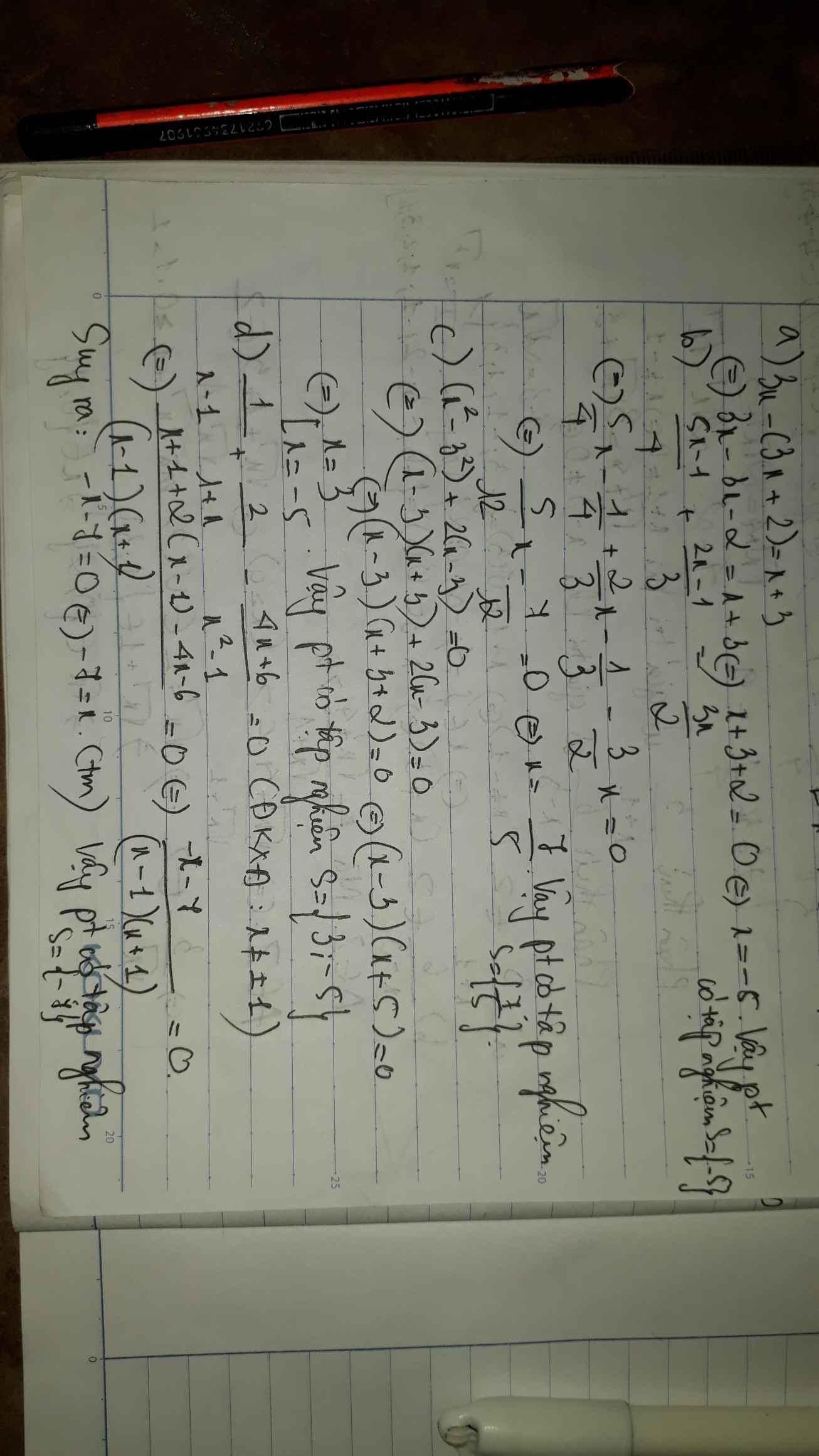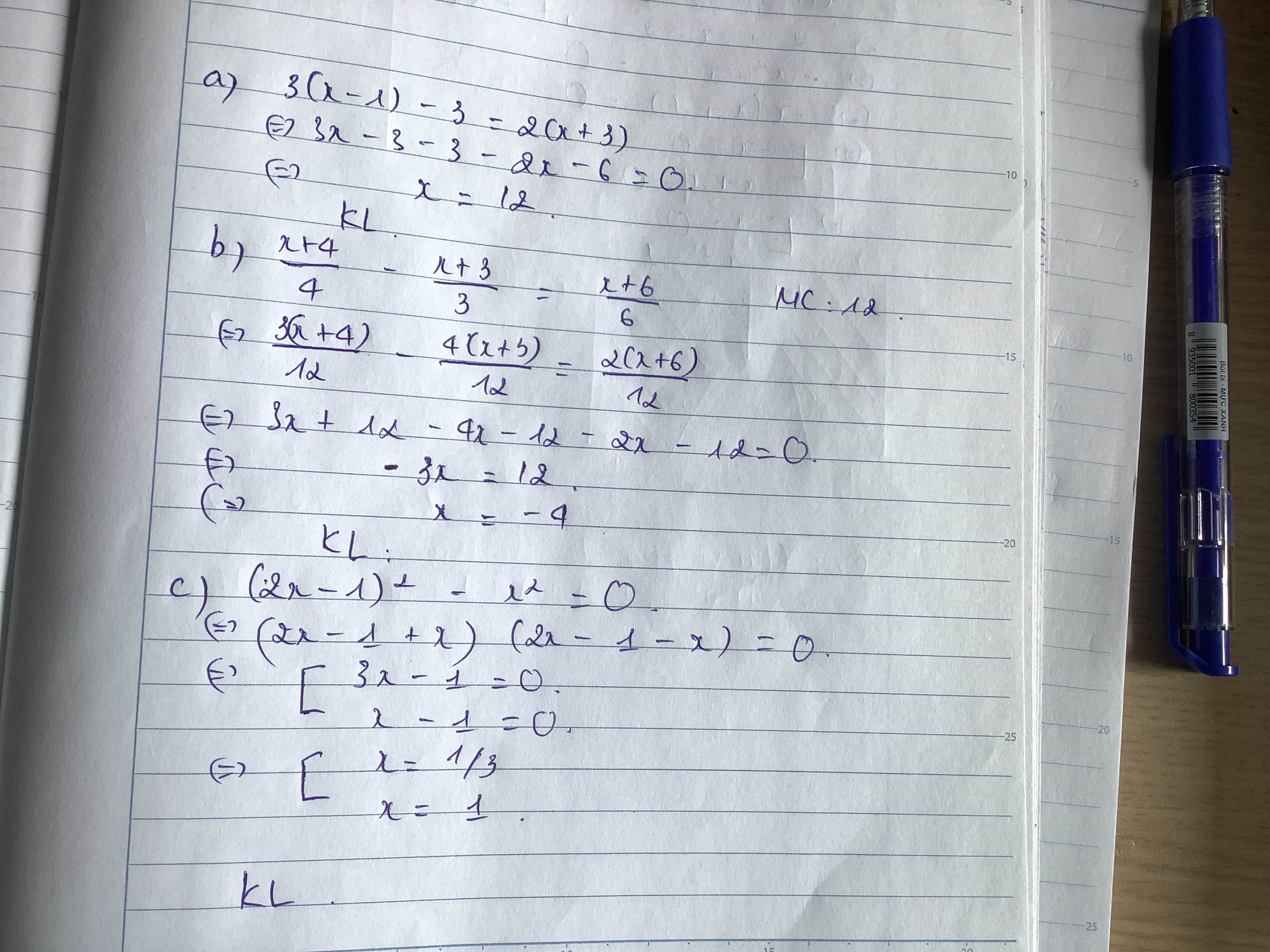Hãy nhập câu hỏi của bạn vào đây, nếu là tài khoản VIP, bạn sẽ được ưu tiên trả lời.

a: 3x-15=0
nên 3x=15
hay x=5
b: 4x+20=0
nên 4x=-20
hay x=-5
c: -5x-20=0
nên -5x=20
hay x=-4

a: Ta có: \(3x-\left(3x+2\right)=x+3\)
\(\Leftrightarrow x+3=-2\)
hay x=-5
b: Ta có: \(\dfrac{5x-1}{4}+\dfrac{2x-1}{3}=\dfrac{3x}{2}\)
\(\Leftrightarrow15x-3+8x-4=18x\)
\(\Leftrightarrow5x=7\)
hay \(x=\dfrac{7}{5}\)

Bài `1:`
`h)(3/4x-1)(5/3x+2)=0`
`=>[(3/4x-1=0),(5/3x+2=0):}=>[(x=4/3),(x=-6/5):}`
______________
Bài `2:`
`b)3x-15=2x(x-5)`
`<=>3(x-5)-2x(x-5)=0`
`<=>(x-5)(3-2x)=0<=>[(x=5),(x=3/2):}`
`d)x(x+6)-7x-42=0`
`<=>x(x+6)-7(x+6)=0`
`<=>(x+6)(x-7)=0<=>[(x=-6),(x=7):}`
`f)x^3-2x^2-(x-2)=0`
`<=>x^2(x-2)-(x-2)=0`
`<=>(x-2)(x^2-1)=0<=>[(x=2),(x^2=1<=>x=+-2):}`
`h)(3x-1)(6x+1)=(x+7)(3x-1)`
`<=>18x^2+3x-6x-1=3x^2-x+21x-7`
`<=>15x^2-23x+6=0<=>15x^2-5x-18x+6=0`
`<=>(3x-1)(5x-1)=0<=>[(x=1/3),(x=1/5):}`
`j)(2x-5)^2-(x+2)^2=0`
`<=>(2x-5-x-2)(2x-5+x+2)=0`
`<=>(x-7)(3x-3)=0<=>[(x=7),(x=1):}`
`w)x^2-x-12=0`
`<=>x^2-4x+3x-12=0`
`<=>(x-4)(x+3)=0<=>[(x=4),(x=-3):}`
`m)(1-x)(5x+3)=(3x-7)(x-1)`
`<=>(1-x)(5x+3)+(1-x)(3x-7)=0`
`<=>(1-x)(5x+3+3x-7)=0`
`<=>(1-x)(8x-4)=0<=>[(x=1),(x=1/2):}`
`p)(2x-1)^2-4=0`
`<=>(2x-1-2)(2x-1+2)=0`
`<=>(2x-3)(2x+1)=0<=>[(x=3/2),(x=-1/2):}`
`r)(2x-1)^2=49`
`<=>(2x-1-7)(2x-1+7)=0`
`<=>(2x-8)(2x+6)=0<=>[(x=4),(x=-3):}`
`t)(5x-3)^2-(4x-7)^2=0`
`<=>(5x-3-4x+7)(5x-3+4x-7)=0`
`<=>(x+4)(9x-10)=0<=>[(x=-4),(x=10/9):}`
`u)x^2-10x+16=0`
`<=>x^2-8x-2x+16=0`
`<=>(x-2)(x-8)=0<=>[(x=2),(x=8):}`

1,\(3x-1=0\Leftrightarrow3x=-1\Leftrightarrow x=-\dfrac{1}{3}\)
2,\(2-x=3x+1\Leftrightarrow2-1=3x+x\rightarrow1=4x\Rightarrow x=-\dfrac{1}{4}\)
3,\(2\left(x-2\right)-1=5x\Leftrightarrow2x-4-1=5x\Leftrightarrow2x-5x=4+1\Rightarrow3x=5\Rightarrow x=\dfrac{5}{3}\)
4,\(\dfrac{x}{3}-\dfrac{x}{5}=4\Leftrightarrow\dfrac{5x}{15}-\dfrac{3x}{15}=\dfrac{60}{15}\Rightarrow5x-3x=60\Rightarrow2x=60\Rightarrow x=\dfrac{60}{2}=30\)

a: =>3,6-1,7x=2,3-1,4-4=0,9-4=-3,1
=>1,7x=6,7
hay x=67/17
b: \(\Leftrightarrow30\left(5x+4\right)-15\left(3x+5\right)=24\left(4x+9\right)-40\left(x-9\right)\)
=>150x+120-45x-75=96x+216-40x+360
=>105x+45=56x+576
=>49x=531
hay x=531/49

a) \(15 - 4x = x - 5\)
\( - 4x - x = - 5 - 15\) (chuyển vế)
\( - 5x = - 20\)
\(x = \left( { - 20} \right):\left( { - 5} \right)\) (chia cho một số)
\(x = 4\)
Vậy phương trình có nghiệm \(x = 4\).
b) \(\dfrac{{5x + 2}}{4} + \dfrac{{3x - 2}}{3} = \dfrac{3}{2}\)
\(\dfrac{{\left( {5x + 2} \right).3}}{{4.3}} + \dfrac{{\left( {3x - 2} \right).4}}{{3.4}} = \dfrac{{3.6}}{{2.6}}\) (quy đồng mẫu số)
\(\dfrac{{15x + 6}}{{12}} + \dfrac{{12x - 8}}{{12}} = \dfrac{{18}}{{12}}\)
\(15x + 6 + 12x - 8 = 18\) (chia cả hai vế cho một số)
\(15x + 12x = 18 - 6 + 8\) (chuyển vế)
\(27x = 20\) (rút gọn)
\(x = 20:27\) (chia cả hai vế co một số)
\(x = \dfrac{{20}}{{27}}\)
Vậy phương trình có nghiệm \(x = \dfrac{{20}}{{27}}\).

a: =>3x-9+5+10x=90
=>13x-4=90
=>13x=94
hay x=94/13
b: \(\Leftrightarrow2x-4-x-1=3x-11\)
=>3x-11=x-5
=>2x=6
hay x=3(nhận)

d: Ta có: \(\dfrac{x}{x+3}-\dfrac{2x}{x-3}-\dfrac{3x}{9-x^2}=0\)
\(\Leftrightarrow x^2-3x-2x^2-6x+3x=0\)
\(\Leftrightarrow-x^2-6x=0\)
\(\Leftrightarrow-x\left(x+6\right)=0\)
\(\Leftrightarrow\left[{}\begin{matrix}x=0\left(nhận\right)\\x=-6\left(nhận\right)\end{matrix}\right.\)

a) ĐKXĐ: \(x\ne0\)
Ta có: \(\dfrac{1}{3x}+\dfrac{1}{2x}=\dfrac{1}{4}\)
\(\Leftrightarrow\dfrac{4}{12x}+\dfrac{6}{12x}=\dfrac{3x}{12x}\)
Suy ra: \(3x=10\)
\(\Leftrightarrow x=\dfrac{10}{3}\)(thỏa ĐK)
Vậy: \(S=\left\{\dfrac{10}{3}\right\}\)
b) ĐKXĐ: \(x\ne0\)
Ta có: \(\dfrac{3}{8x}-\dfrac{1}{2x}=\dfrac{1}{x^2}\)
\(\Leftrightarrow\dfrac{3x}{8x^2}-\dfrac{4x}{8x^2}=\dfrac{8}{8x^2}\)
Suy ra: \(3x-4x=8\)
\(\Leftrightarrow-x=8\)
hay x=-8(thỏa ĐK)
Vậy: S={-8}
c)ĐKXĐ: \(x\ne0\)
Ta có: \(\dfrac{1}{2x}+\dfrac{3}{4x}=\dfrac{5}{2x^2}\)
\(\Leftrightarrow\dfrac{2x}{4x^2}+\dfrac{3x}{4x^2}=\dfrac{10}{4x^2}\)
Suy ra: 2x+3x=10
\(\Leftrightarrow5x=10\)
hay x=2(thỏa ĐK)
Vậy: S={2}
d, \(\dfrac{2a}{x+a}=1\) (x \(\ne\) -a)
\(\Leftrightarrow\) \(\dfrac{2a}{x+a}-\dfrac{x+a}{x+a}=0\)
\(\Leftrightarrow\) \(\dfrac{a-x}{x+a}=0\)
\(\Leftrightarrow\) a - x = 0 (x + a \(\ne\) 0)
\(\Leftrightarrow\) x = a (TM)
Vậy S = {a}
Chúc bn học tốt!


a) \(5x - 30 = 0\)
\(5x = 0 + 30\)
\(5x = 30\)
\(x = 30:5\)
\(x = 6\)
Vậy phương trình có nghiệm \(x = 6\).
b) \(4 - 3x = 11\)
\( - 3x = 11 - 4\)
\( - 3x = 7\)
\(x = \left( { 7} \right):\left( { - 3} \right)\)
\(x = \dfrac{-7}{3}\)
Vậy phương trình có nghiệm \(x = \dfrac{7}{3}\).
c) \(3x + x + 20 = 0\)
\(4x + 20 = 0\)
\(4x = 0 - 20\)
\(4x = - 20\)
\(x = \left( { - 20} \right):4\)
\(x = - 5\)
Vậy phương trình có nghiệm \(x = - 5\).
d) \(\dfrac{1}{3}x + \dfrac{1}{2} = x + 2\)
\(\dfrac{1}{3}x - x = 2 - \dfrac{1}{2}\)
\(\dfrac{{ - 2}}{3}x = \dfrac{3}{2}\)
\(x = \dfrac{3}{2}:\left( {\dfrac{{ - 2}}{3}} \right)\)
\(x = \dfrac{{ - 9}}{4}\)
Vậy phương trình có nghiệm \(x = \dfrac{{ - 9}}{4}\).
xem lại câu b nha, tại vì trên là 7 dưới -7